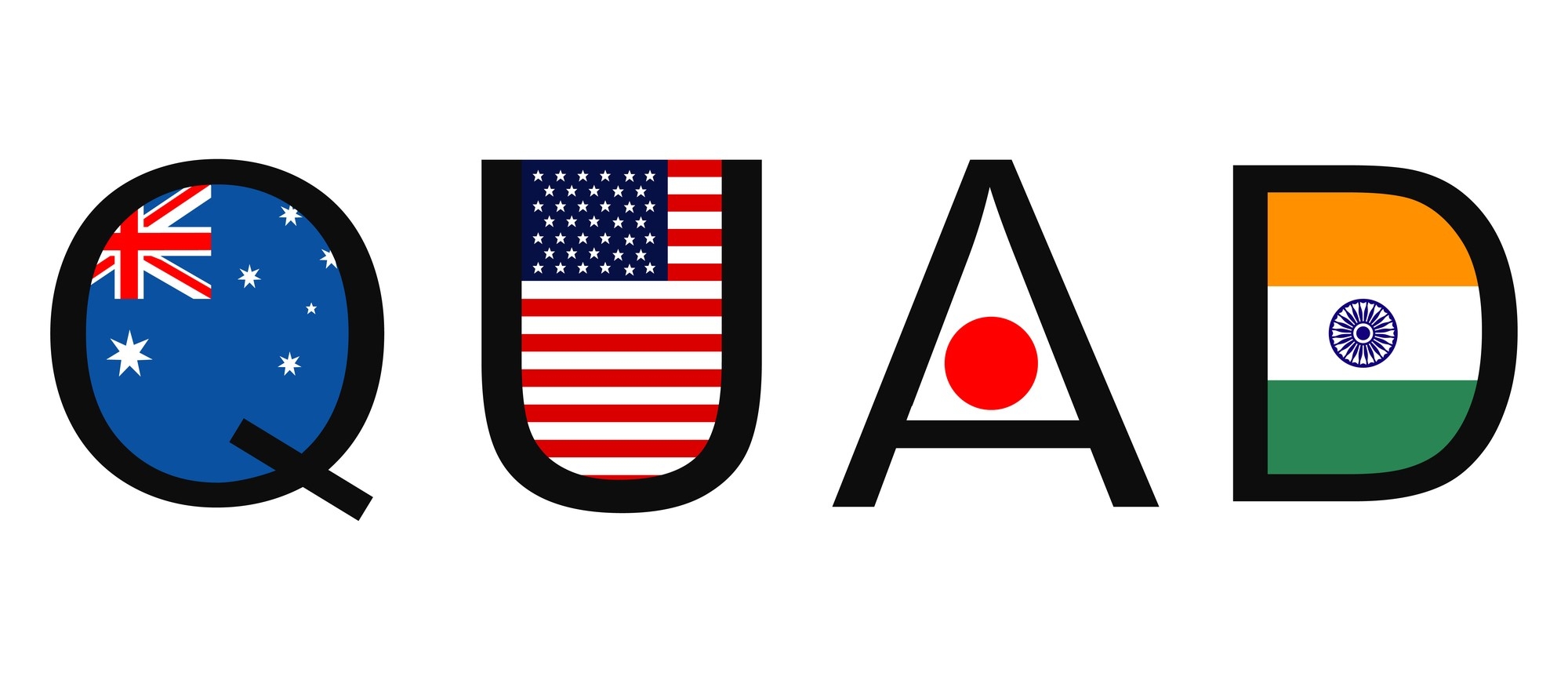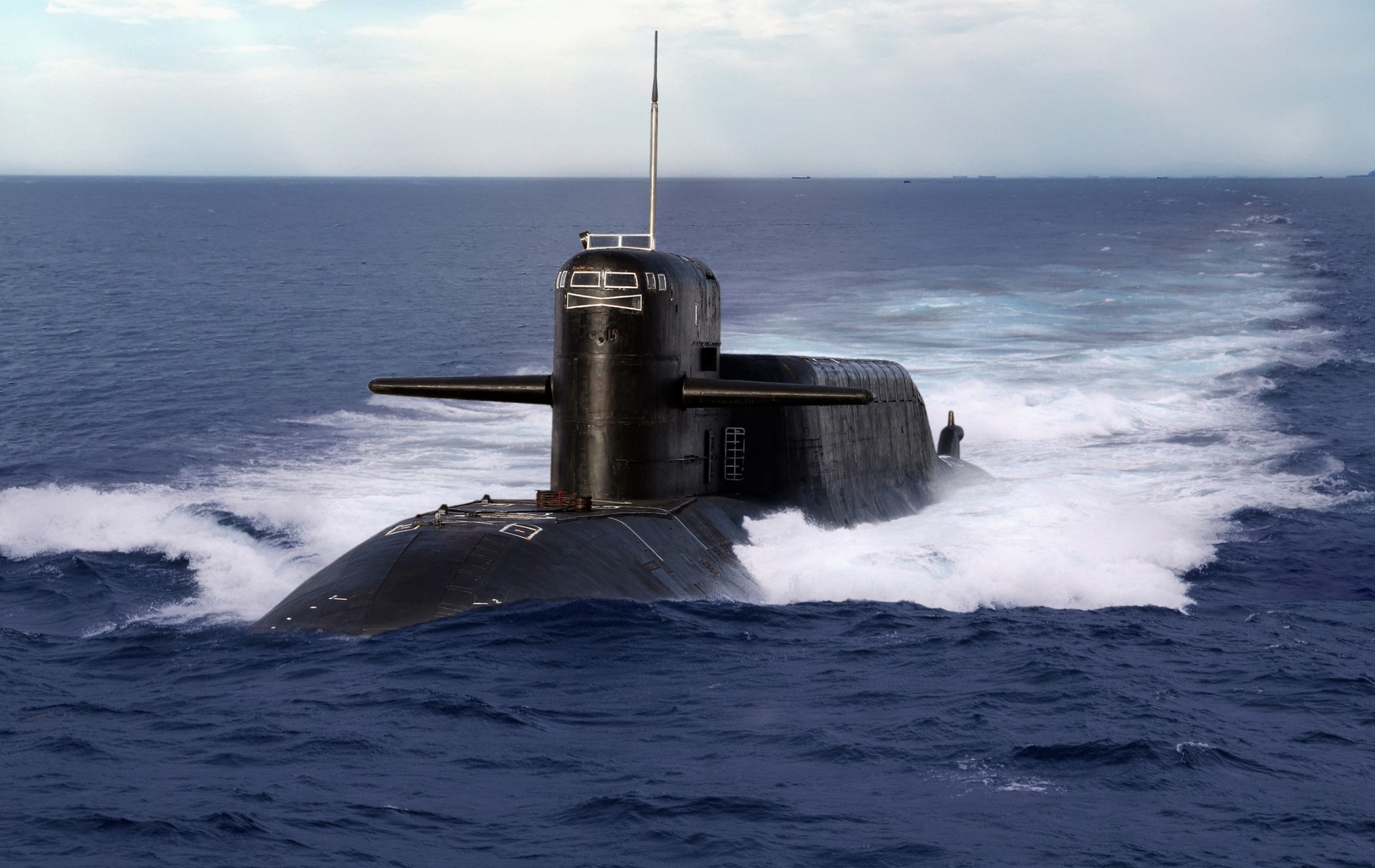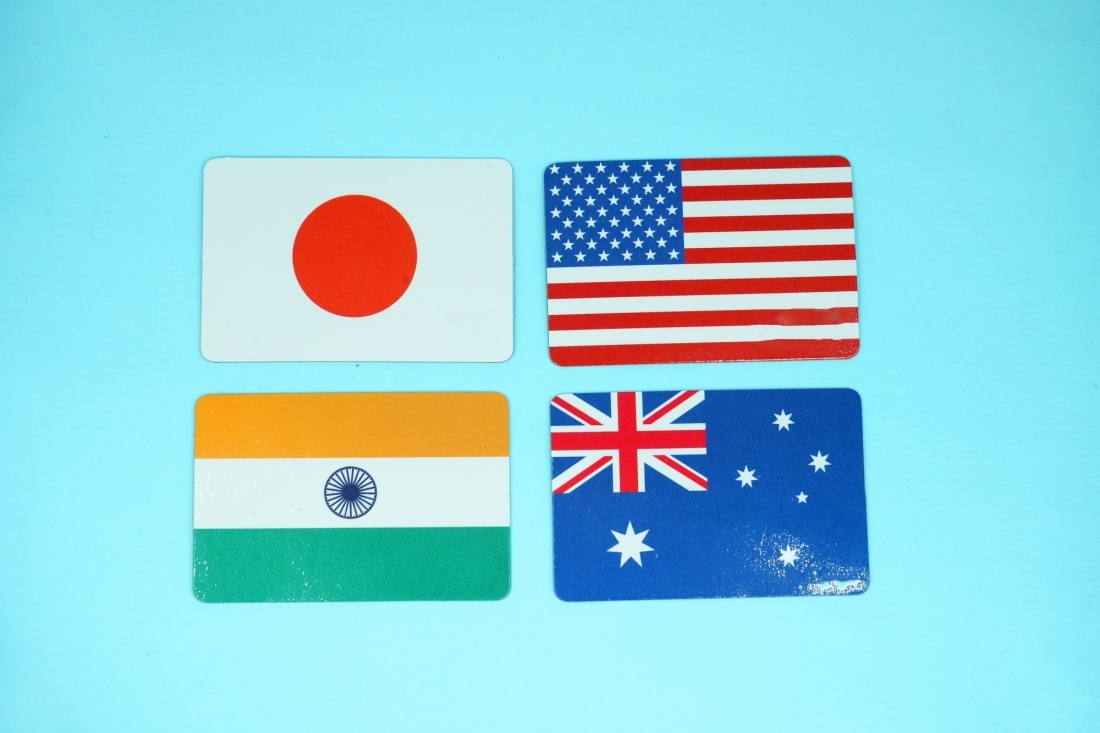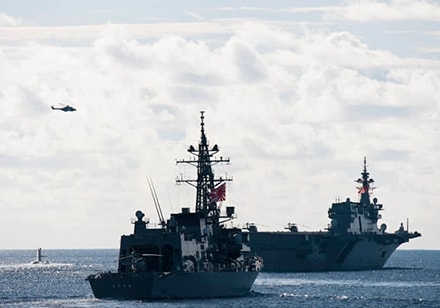POLICY
Is the QUAD a Vehicle for Implementing the FOIP?
November 27, 2023
The FOIP (‘Free and Open Indo-Pacific’) and the QUAD have consistently been linked in both policy and political rhetoric, but can the QUAD become an ‘essential instrument’ for achieving the FOIP?
Certainly for former Prime Minister Abe Shinzo, ‘the founding father of the FOIP’ who pioneered, developed and realized the Indo-Pacific concept and who was also considered the ‘QuadFather’ and ‘first initiator of the QUAD regional grouping’, there was an indelible and enduring connection between the two.
Abe envisaged the FOIP as a ‘strategy’ based on his concept of a ‘democratic security diamond’, a security partnership or strategic coalition, ‘in which Japan, the United States, India and Australia would “safeguard the maritime commons stretching from the Indian Ocean region to the western Pacific” to defend the existing regional order and oppose Chinese ‘coercion’. The core elements of this ‘security diamond’ matched the QUAD, which was designated as the key instrument for achieving the FOIP. Abe was ‘a strong believer in the power of the QUAD…(which he described as ‘a strategic forum of four democratic nations’ to ensure a 'free and open Indo-Pacific”’.
Historically, the QUAD and the FOIP have progressed in parallel. In November 2017, the main agenda of a key meeting of senior officials from QUAD nations in Manila was how to progress ‘regional and global cooperation’ under the overarching theme of a ‘free and open Indo-Pacific’, which had been officially launched by Abe the year before in 2016. The FOIP would later ‘become the Quad’s mantra’.
Certainly for former Prime Minister Abe Shinzo, ‘the founding father of the FOIP’ who pioneered, developed and realized the Indo-Pacific concept and who was also considered the ‘QuadFather’ and ‘first initiator of the QUAD regional grouping’, there was an indelible and enduring connection between the two.
Abe envisaged the FOIP as a ‘strategy’ based on his concept of a ‘democratic security diamond’, a security partnership or strategic coalition, ‘in which Japan, the United States, India and Australia would “safeguard the maritime commons stretching from the Indian Ocean region to the western Pacific” to defend the existing regional order and oppose Chinese ‘coercion’. The core elements of this ‘security diamond’ matched the QUAD, which was designated as the key instrument for achieving the FOIP. Abe was ‘a strong believer in the power of the QUAD…(which he described as ‘a strategic forum of four democratic nations’ to ensure a 'free and open Indo-Pacific”’.
Historically, the QUAD and the FOIP have progressed in parallel. In November 2017, the main agenda of a key meeting of senior officials from QUAD nations in Manila was how to progress ‘regional and global cooperation’ under the overarching theme of a ‘free and open Indo-Pacific’, which had been officially launched by Abe the year before in 2016. The FOIP would later ‘become the Quad’s mantra’.

In this context the QUAD functioned as a practical mechanism for promoting security dialogue and cooperation between Japan and other countries that shared its core security interests in the Indo-Pacific. The 2017 meeting also underlined the emerging significance of the QUAD as a grouping designed to advance the FOIP by acting as ‘one of the key policy coordination mechanisms…for maintaining the rules-based order’.
As it has evolved, the FOIP has combined the elements of ‘strategy’ – as conceived by Abe –with ‘common strategic framework’ and strategic concept, or ‘vision’, under which the QUAD and other Indo-Pacific nations can cooperate to implement agreed goals that harmonise with the FOIP. In 2018, the FOIP was described as providing the ‘strategic vision’ around which QUAD members have now ‘broadly coalesced’.
The QUAD also developed into an increasingly effective and united instrument for achieving the FOIP’s ‘regional order-building’ objective as well as other common and related goals. The 2017 QUAD meeting launched the process that led to greater defence cooperation amongst the participants. While incremental, this development pointed to a potentially expanding role for the QUAD in actually enforcing the FOIP in practical military terms by acting against nations that violated its principles. At the September 2019 meeting of QUAD foreign ministers they explicitly agreed for the first time to cooperate on ‘advancing a free and open Indo-Pacific’.
Kishida Fumio, spoke to QUAD leaders within days of becoming prime minister in October 2021, indicating the priority he attached to establishing solid relations with QUAD partners. He reportedly viewed the QUAD as ‘a way to realize a free and open Indo-Pacific governed by the rule of law’ and thus for his government, cooperation with like-minded nations remains essential.
The Vision Statement coming from the QUAD leaders’ May 2023 meeting in Hiroshima likewise reaffirmed the participants’ ‘steadfast commitment to work through the QUAD to support a free and open Indo-Pacific’ thus implicitly criticising China’s militarized behaviour that violated these principles, particularly in the East and South China Seas. The FOIP thus provides a ‘unifying ideational construct [for QUAD members]…in dealing with China and its challenges to maritime boundaries and international law’. It is the common strategic framework and ‘vision’ under which QUAD countries that oppose this behaviour can cooperate in various areas, with its core objective being to construct a rules-based order in the Indo-Pacific, particularly challenging behaviour that violates international law.
The QUAD has also functioned as an embryonic strategic partnership that provides a mechanism for increasing defence cooperation amongst its members, including political dialogues and security consultations as well as naval exercises seeking to advance the fundamental principles of the FOIP – the core principle being ‘ensuring a free and open Indo-Pacific that is respectful of a rules-based order’. This remains the common strategic goal of QUAD members with a focus on balancing China. At the same time, the QUAD is gradually moving beyond a ‘loose strategic coalition’ and instrument of ‘soft deterrence’ towards acquiring a potentially expanding and strengthening element of hard military deterrence, with the FOIP continuing to underwrite the overriding strategic rationale for the grouping and define its central strategic interest.
While the FOIP has served as a ‘soft’ balancing mechanism against China, the QUAD is, therefore, gradually acquiring elements of a ‘hard’ balancing instrument, a feature that is becoming more apparent in terms of practical military cooperation. Most prominently and significantly, this has manifested in the form of the parallel participation of QUAD member-states in India’s annual Malabar naval exercise since 2020. In this context the QUAD is inching ‘closer to collective maritime defense’ or towards ‘a regional maritime defense collective’, with the evolution of the Malabar exercises moving towards ‘high-end naval cooperation’, including anti-submarine warfare.
The QUAD has also acquired an increasingly prominent diplomatic dimension as a minilateral network not only supporting core FOIP goals and values but also cooperation in delivering public goods such as vaccines, disaster relief and infrastructure, and on issues relating to space, critical and emerging technologies, cyber security and climate change. ‘Hard’ and ‘soft’ are thus progressing in parallel: the ‘hard’ security elements of the QUAD are becoming more apparent alongside these other ‘softer’ and broader cooperation elements.
The QUAD remains a potential enforcement mechanism of the FOIP as a defence partnership pursuing a core, common security goal, although progress towards that goal remains measured. However, as the QUAD moves forward both in terms of ‘hard’ defence cooperation, with greater interoperability in military exercises, and as a multi-dimensional grouping developing new facets of cooperation, a more expansive, multi-dimensional vision of the FOIP is also progressing.
Prime Minister Kishida outlined a new and expansive vision of Japan’s FOIP goals and strategy with his ‘New Plan’ presented in a speech in India in March 2023. It embraces a multi-dimensional concept and inclusive vision of the desirable links, principles and goals amongst countries in the Indo-Pacific region. These are elaborated in the ‘Four Pillars’ of the ‘New Plan’, which present a comprehensive and detailed vision for regional peace and prosperity as well as the desired Indo-Pacific way of achieving them. Multilateral cooperation and agreed rules, principles and goals are proposed for the delivery of public goods in diverse areas such as trade, ‘hard’ and ‘soft’ connectivity, human rights, international peace and coast guard cooperation, disaster risk reduction, transportation infrastructure, global health, climate change measures, fisheries, and energy security. Amongst proposed rules and principles are concepts such as ‘free and fair’, ‘international rules and standards’, ‘rule of law’ and ‘rule of law at sea’. The New Plan’s core objectives are thus Indo-Pacific peace and prosperity in the broadest sense as well as the principled conduct of states and governments extending well beyond the current QUAD membership.
Significantly, as Kishida emphasised in his presentational speech, while ‘the fundamental concept of FOIP remains the same….Another equally important principle of FOIP is respect for “diversity”, “inclusiveness” and “openness”. In other words, we do not exclude anyone, we do not create camps and we do not impose values’. Although the FOIP continues to act as a policy counterweight to China’s influence in a wide range of different dimensions and countries, it has, therefore, evolved from a strategy explicitly focussing on security concerns relating to China to a ‘more inclusive vision that embraces non-security issues and is not explicitly aimed at any one state’. In many ways, this more expansive vision also matches the broadening of the QUAD agenda.
As it has evolved, the FOIP has combined the elements of ‘strategy’ – as conceived by Abe –with ‘common strategic framework’ and strategic concept, or ‘vision’, under which the QUAD and other Indo-Pacific nations can cooperate to implement agreed goals that harmonise with the FOIP. In 2018, the FOIP was described as providing the ‘strategic vision’ around which QUAD members have now ‘broadly coalesced’.
The QUAD also developed into an increasingly effective and united instrument for achieving the FOIP’s ‘regional order-building’ objective as well as other common and related goals. The 2017 QUAD meeting launched the process that led to greater defence cooperation amongst the participants. While incremental, this development pointed to a potentially expanding role for the QUAD in actually enforcing the FOIP in practical military terms by acting against nations that violated its principles. At the September 2019 meeting of QUAD foreign ministers they explicitly agreed for the first time to cooperate on ‘advancing a free and open Indo-Pacific’.
Kishida Fumio, spoke to QUAD leaders within days of becoming prime minister in October 2021, indicating the priority he attached to establishing solid relations with QUAD partners. He reportedly viewed the QUAD as ‘a way to realize a free and open Indo-Pacific governed by the rule of law’ and thus for his government, cooperation with like-minded nations remains essential.
The Vision Statement coming from the QUAD leaders’ May 2023 meeting in Hiroshima likewise reaffirmed the participants’ ‘steadfast commitment to work through the QUAD to support a free and open Indo-Pacific’ thus implicitly criticising China’s militarized behaviour that violated these principles, particularly in the East and South China Seas. The FOIP thus provides a ‘unifying ideational construct [for QUAD members]…in dealing with China and its challenges to maritime boundaries and international law’. It is the common strategic framework and ‘vision’ under which QUAD countries that oppose this behaviour can cooperate in various areas, with its core objective being to construct a rules-based order in the Indo-Pacific, particularly challenging behaviour that violates international law.
The QUAD has also functioned as an embryonic strategic partnership that provides a mechanism for increasing defence cooperation amongst its members, including political dialogues and security consultations as well as naval exercises seeking to advance the fundamental principles of the FOIP – the core principle being ‘ensuring a free and open Indo-Pacific that is respectful of a rules-based order’. This remains the common strategic goal of QUAD members with a focus on balancing China. At the same time, the QUAD is gradually moving beyond a ‘loose strategic coalition’ and instrument of ‘soft deterrence’ towards acquiring a potentially expanding and strengthening element of hard military deterrence, with the FOIP continuing to underwrite the overriding strategic rationale for the grouping and define its central strategic interest.
While the FOIP has served as a ‘soft’ balancing mechanism against China, the QUAD is, therefore, gradually acquiring elements of a ‘hard’ balancing instrument, a feature that is becoming more apparent in terms of practical military cooperation. Most prominently and significantly, this has manifested in the form of the parallel participation of QUAD member-states in India’s annual Malabar naval exercise since 2020. In this context the QUAD is inching ‘closer to collective maritime defense’ or towards ‘a regional maritime defense collective’, with the evolution of the Malabar exercises moving towards ‘high-end naval cooperation’, including anti-submarine warfare.
The QUAD has also acquired an increasingly prominent diplomatic dimension as a minilateral network not only supporting core FOIP goals and values but also cooperation in delivering public goods such as vaccines, disaster relief and infrastructure, and on issues relating to space, critical and emerging technologies, cyber security and climate change. ‘Hard’ and ‘soft’ are thus progressing in parallel: the ‘hard’ security elements of the QUAD are becoming more apparent alongside these other ‘softer’ and broader cooperation elements.
The QUAD remains a potential enforcement mechanism of the FOIP as a defence partnership pursuing a core, common security goal, although progress towards that goal remains measured. However, as the QUAD moves forward both in terms of ‘hard’ defence cooperation, with greater interoperability in military exercises, and as a multi-dimensional grouping developing new facets of cooperation, a more expansive, multi-dimensional vision of the FOIP is also progressing.
Prime Minister Kishida outlined a new and expansive vision of Japan’s FOIP goals and strategy with his ‘New Plan’ presented in a speech in India in March 2023. It embraces a multi-dimensional concept and inclusive vision of the desirable links, principles and goals amongst countries in the Indo-Pacific region. These are elaborated in the ‘Four Pillars’ of the ‘New Plan’, which present a comprehensive and detailed vision for regional peace and prosperity as well as the desired Indo-Pacific way of achieving them. Multilateral cooperation and agreed rules, principles and goals are proposed for the delivery of public goods in diverse areas such as trade, ‘hard’ and ‘soft’ connectivity, human rights, international peace and coast guard cooperation, disaster risk reduction, transportation infrastructure, global health, climate change measures, fisheries, and energy security. Amongst proposed rules and principles are concepts such as ‘free and fair’, ‘international rules and standards’, ‘rule of law’ and ‘rule of law at sea’. The New Plan’s core objectives are thus Indo-Pacific peace and prosperity in the broadest sense as well as the principled conduct of states and governments extending well beyond the current QUAD membership.
Significantly, as Kishida emphasised in his presentational speech, while ‘the fundamental concept of FOIP remains the same….Another equally important principle of FOIP is respect for “diversity”, “inclusiveness” and “openness”. In other words, we do not exclude anyone, we do not create camps and we do not impose values’. Although the FOIP continues to act as a policy counterweight to China’s influence in a wide range of different dimensions and countries, it has, therefore, evolved from a strategy explicitly focussing on security concerns relating to China to a ‘more inclusive vision that embraces non-security issues and is not explicitly aimed at any one state’. In many ways, this more expansive vision also matches the broadening of the QUAD agenda.

Overall, the FOIP and the QUAD represent two of Japan’s most important contributions to reshaping the strategic architecture of the Indo-Pacific region. Former Prime Minister Abe acted as the inspiring force behind these concepts while Prime Minister Kishida has supported and developed them by sponsoring diplomatic, defence and other forms of cooperation including launching a range of initiatives that embody Japan’s diplomatic, technological, economic and strategic leadership in the region. He has taken significant steps to expand both the QUAD partnership and the FOIP vision into multi-dimensional cooperation frameworks, with his ‘New Plan’, a comprehensive set of proposals for cooperation that move well beyond hard security issues.





